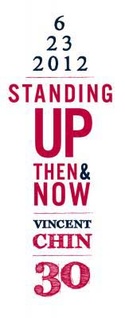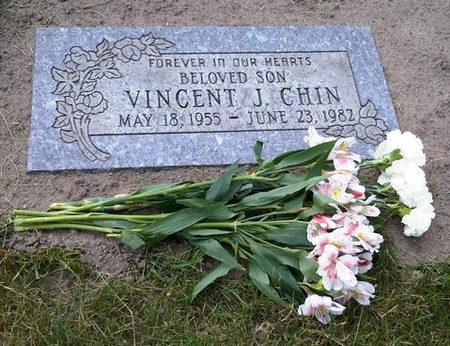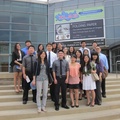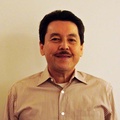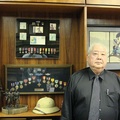Thirty years ago from this past Saturday, on June 23, 1982, Vincent Chin died. Four nights earlier, on June 19th, Chin had been celebrating his bachelor party in a Detroit, Michigan strip club when he got tangled up with two white autoworkers who mistook Chin (who was Chinese American) for Japanese and blamed him for the rise of Japanese auto industries and the loss of their own jobs. The brief fight was broken up, and Chin and his friends left the club. It took twenty minutes for the two white men, Ronald Ebens and his stepson Michael Nitz, to find Chin in front of a fast-food restaurant, where they took turns beating Chin with a baseball bat. He died five days before his wedding.
Chin’s last words before slipping into a coma—“It’s not fair…”—captured the injustice that not only surrounded his murder but also the injustice of his murderers’ punishment. After Ebens and Nitz pleaded guilty to manslaughter, they each received probation and a $3,000 fine. The absence of jail sentence for Chin’s murder outraged Asian American communities throughout the nation and galvanized a major Asian American civil rights movement as activists and community leaders came together to form the pan-Asian organization, American Citizens for Justice (ACJ), to demand justice for the murder of Vincent Chin (AsianWeek, “Remembering Vincent Chin”).
This past Saturday, the Japanese American National Museum’s National Center for the Preservation of Democracy hosted a Los Angeles-based viewing party of a panel discussion that featured prominent figures from the nonprofit and legal communities throughout the United States. The discussion, broadcast by way of Google Hangout, featured speakers who brought up some very powerful points about the Vincent Chin case and its implications for the Nikkei community, the larger Asian American community, and also people of color in general.
In particular, one of the panelists participating in the panel discussion, Zahra Billoo—labor rights advocate and executive director of the Council on American-Islamic Relations—made some powerful points in the panel discussion.
Billoo reminded all the viewers that hate crimes affect entire communities and made a strong case for cross-community solidarity. She cited the example of Nikkei community leaders who, in the wake of the September 11, 2001 attacks on the World Trade Center, came out in support of the Muslim American community and warned against dangerous scapegoating and an anti-Muslim episode similar to the mass incarceration of West Coast Japanese Americans during World War II. Insofar as hate crimes have devastating impacts on whole communities, Billoo argued in favor of solidarity that would be built across racial, ethnic, and religious lines. “The only way we can make progress [against oppression] is we fight it together,” she said.
Sadly, but certainly not surprisingly, the scapegoating of subordinated/minority groups that necessarily accompanies any economic downturn or turmoil in the United States is part and parcel of the darker side of the American historical tradition. Vincent Chin’s murder came in the midst of strong anti-Japanese sentiment in the United States. As Frank Wu notes in his recent New York Times op-ed piece on the implications of the Chin case,
[t]he circumstances of the Chin case were no accident. The early 1980s were, like now, a time of malaise. The unemployment rate was at its highest since World War II; inflation was stuck in the double digits; “Japan Inc.” threatened to devour not only Detroit manufacturing but also New York real estate. White flight had emptied a great metropolis that once stood for industrial progress. Imported cars became a hated symbol of foreign encroachment. (Wu, “Why Vincent Chin Matters”)
In true American tradition, then, the American public in the 1980s had been scapegoating Japanese Americans—and everyone who in some way visually symbolized “Japanese”—for its economic woes. And this process of racialization through which Asians and Asian Americans alike are perceived and imagined as “foreigners” is a significant and alarming one. From the outset, the murder of Vincent Chin has had particular import because it was a situation in which a Chinese American man was mistaken for being Japanese. Vincent Chin was not attacked because he was ethnically Chinese American; he was attacked because two angry, white autoworkers perceived Chin (and his race) as representative of the foreign threat they associated with Japanese auto manufacturers. For Asians and Asian Americans, it means that if it could happen to Vincent, it could happen to any one of us.
Vincent Chin fell victim to an act of racist violence and oppression that was rooted in how Asians are racialized in the context of the United States. But this awareness of racialization and oppression against Asian Americans, especially through the national attention surrounding the Chin case, further solidified a national Asian American consciousness and the rearticulation of “Asian American” as not simply a racial category but also a political category through which anyone could self-identify as a tool of empowerment and consciousness.
For me, identifying myself as Asian American has always been a conscious and a political choice. In calling myself Asian American, I am also aligning myself with a certain set of progressive/left politics that attempts to recognize and challenge the processes of racialization and oppression that Asian Americans and other communities of color have experienced in the United States. I think that the Chin case allowed people who had previously self-identified as Chinese, Japanese, Korean, Filipino, Vietnamese, etc., to realize that—in some way—we are all Asian American not simply to the extent that we are racialized that way by the mainstream public, but also inasmuch as we come together to identify our shared lived experiences and to fight anti-Asian violence/sentiment in all its manifestations.
Another important take-away from Vincent Chin’s murder for me is the promise and the potential of grassroots community organizing. There is certainly something to be said for the way in which the Chin case galvanized Asian ethnic groups into working together to create an unprecedented Asian American civil rights movement. Way before young people were slinging internet vernacular and tweeting and texting, there was the impressive grassroots organizing against racism without the internet. It is a testament to the ability of people to come together and sustain a strong social movement centered on one unified cause, no matter the odds. And that’s certainly refreshing and reaffirming.
Rest in peace and power, Vincent Chin.
Works Cited
Wu, Frank H. “Why Vincent Chin Matters.” New York Times, June 22, 2012. http://www.nytimes.com/2012/06/23/opinion/why-vincent-chin-matters.html?_r=1 (Accessed online on June 23, 2012).
Yip, Alethea. “Remembering Vincent Chin.” AsianWeek, June 5-13, 1997. http://asianweek.com/061397/feature.html (Accessed online on June 26, 2012).
*This is one of the projects completed by The Nikkei Community Internship (NCI) Program intern each summer, which the Japanese American Bar Association and the Japanese American National Museum have co-hosted.
© 2012 Lawrence Lan


